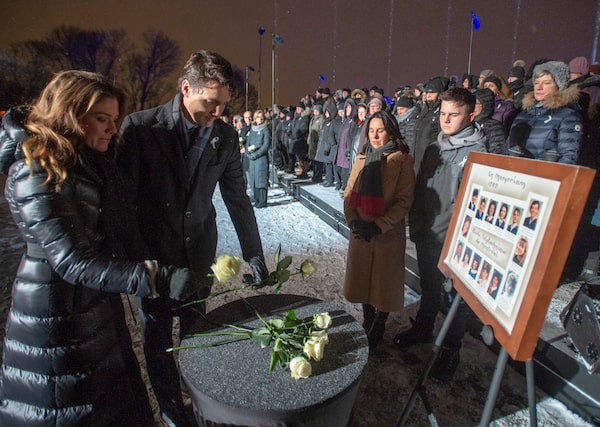
Prime Minister Justin Trudeau and his wife, Sophie Grégoire Trudeau, place roses during ceremonies to mark the 30th anniversary of the 1989 École Polytechnique attack, in Montreal, on Dec. 6, 2019.Ryan Remiorz/The Canadian Press
The country’s most prominent gun-control group says Prime Minister Justin Trudeau won’t be welcome at the next memorial to the victims of the Montreal massacre after his government watered down its assault-style firearms ban.
“We won’t invite him and if he wants to come, we will not agree for him to be there,” said Nathalie Provost, who was injured in the 1989 mass shooting at École Polytechnique, where 14 women were killed.
On Monday the federal government presented a revised plan to ban assault-style weapons. The new amendments to Bill C-21 replaced ones tabled last year that would have banned current and future firearms that the government said constituted assault-style weapons. It was pulled by the Liberals after the proposal prompted widespread accusations of overreach.
The new proposal establishes a legal definition of assault-style firearms that would automatically ban any gun that falls under the definition. It will apply only to guns that are designed after the amendments become law. The government dropped another part of its amendments that would have banned 482 firearms currently on the market and already owned and used by Canadians.
Ms. Provost, who is part of the gun-control group PolySeSouvient, which translates to PolyRemembers, said Tuesday she feels “sad, angry, deceived” by the government. She said the new plan is a “very weak” law because it doesn’t put new limits on anything currently on the market.
“It’s a betrayal.”
PolySeSouvient said this marks yet another time that Mr. Trudeau has pledged to implement the group’s demand for a comprehensive ban on assault weapons only to soften his position afterward. Ms. Provost noted that the Prime Minister repeated his promise when he attended the memorial to mark 30 years since the mass shooting that she survived.
Asked Tuesday to respond to the comments from PolySeSouvient and explain why he made a promise that he couldn’t keep, the Prime Minister defended the new policy.
Nathalie Provost, who was injured in the 1989 mass shooting at École Polytechnique, speaks about the government's plans for automatic weapons, in Ottawa, on May 1.Adrian Wyld/The Canadian Press
“Canadians have a clear choice in the next election, between a party that has done significant things to strengthen gun control – and will continue to do more – and the party that wants to form government, that wants to weaken gun control,” Mr. Trudeau said, referring to the Conservatives, who are the only official party in the House that doesn’t support the new amendments.
The government has previously imposed prohibitions on existing assault-style firearms through regulations in 2020 that banned about 1,500 firearms. It had said it would move that ban into legislation to make it more difficult for a future government to reverse but it will no longer move ahead with that.
On Parliament Hill on Tuesday, Public Safety Minister Marco Mendicino also defended the new plan, which he and the NDP have noted is still supported by other gun-control groups, such as Canadian Doctors for Protection from Guns and the Coalition for Gun Control.
Mr. Mendicino also noted that the proposed definition to ban assault-style firearms was lifted from the recommendations from the Nova Scotia Mass Casualty Commission. However, that recommendation isn’t restricted to only future firearm designs and says the ban should apply to “all” guns that would fall under the definition.
Mr. Mendicino also rejected that the new amendments don’t cover currently available firearms and only target ones that would be designed and manufactured after Bill C-21 becomes law. “I’m going to encourage you to read more carefully the language that we have, not only in Bill C-21, but in the propositions that we’ve put forward as well as existing law,” Mr. Mendicino told The Globe.
“When you take all of those things, this is very strong and comprehensive.”
The government’s document explaining the amendments to Bill C-21 says they “would not impact” existing firearms. And Mr. Mendicino’s parliamentary secretary, Pam Damoff, told the House of Commons committee studying the amendments on Tuesday evening that the ban “applies only to guns that have not been invented yet.”
Asked to clarify what the minister meant Tuesday, Mr. Mendicino’s office noted that previously announced bans remain in place, that a more permanent limit on magazine capacity will lead to more restrictions, and a soon-to-be-struck advisory committee will review whether other existing firearms should be prohibited.
Bloc Québécois Leader Yves-François Blanchet said Tuesday the government told his party it will implement regulations to prohibit currently available weapons that “should not be out there.”
Before the government cancelled its plans to ban current firearms that it deemed were assault-style, Mr. Mendicino said the guns “have no place in our communities.”
Now that the government has dropped that portion of the ban, Conservative MP Raquel Dancho told the public safety committee Thursday, the new plan “doesn’t add up” because it doesn’t reflect the government’s previous assessment of those guns. Conservative questions on the new amendments Thursday were so lengthy, the NDP accused the party of filibustering the committee work. At the current pace, NDP MP Peter Julian said the committee would only complete its review in October, 2024.
PolySeSouvient said it will still try to change the amendments before they are passed, but Ms. Provost said that “we are very, very, very disappointed and we are very tired.”
 Marieke Walsh
Marieke Walsh